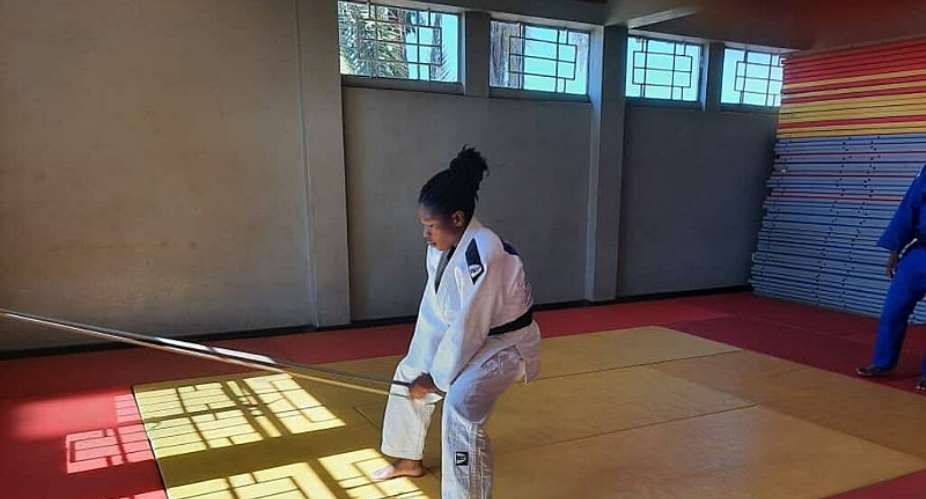From a township of Malawi's capital Lilongwe to the Olympics in Tokyo, judoka athlete Harriet Boniface, 28, is one of the young women in Africa who hopes to make a mark in a sport which has been, for a long time, considered a male discipline.
“My expectation is to break the world record. For the very first time, I want Malawi to win in the Olympic Games and I will be the one [to win for Malawi],” Boniface adds.
She started judo in 2010 and her first trip was in 2012 when she participated at the African youth games in Zambia where she won a bronze medal.
In 2014 she went to the World Judo Championships in Russia and in 2018 to Azerbaijan for the World Judo Championships where, despite not winning any medal, she accumulated points.
In 2019, she went to Cape Town for the African championships and participated in various tournaments in Morocco, Madagascar, and Senegal. As judo originated in Japan, she went to the Japan World Championships in Tokyo and the Japan Grand Slam in Osaka. In total, Boniface has 10 judo medals to her name.
Tripartite allocation
Boniface qualified despite missing out on most of the Olympic qualifiers held this year, including the direct qualification and continental quota, due to the third option, notably the Olympics Tripartite Allocation.
The Tripartite spot is meant to enhance the Olympics' universal appeal by giving small, or disadvantaged countries representation.
Her qualification came as a relief after she failed to compete earlier at the World Judo Championship because of visa complications.
The International Judo Federation had hinted via its website that Boniface was on course to securing qualification to the Olympics.
The Federation explained that Boniface accumulated 222 points from world events and 131 points from Africa events.
“I am very happy that am going to represent Malawi. For me, I am going to compete, fight and win for my country. When I missed the opportunity to compete at the World Championships, I didn't feel bad because I knew that I still had points that could [enable] me to go to the Olympics and now here I am going,” she said.
Childhood experience
Born into a family of eight with five brothers, life was not easy for Boniface, which has given her the drive to become an Olympian.
“I was raised by my grandfather because we were many of us in our family, so it was hard for my parents to provide us with basic essentials,” says Boniface, the third-born daughter.
Growing up with her brothers gave her the confidence that she can do what men can do just as well. She started in track and field before being inspired by a judo coach. Jjudo, she says, is not just a man's sport, and she has proven this time and again.
“Judo has changed my life in a way so that means I am able to help my family financially,” she adds.
Despite the newness of the sport for Malawi, the Malawi federation has managed to win silver and bronze medals in other competitions, says Osbourne Banda, general secretary of the Judo Association of Malawi.
“I remember at first it was '97 when she began participating, and she reached a standing of about 90th in the whole world,” says Banda.
“It was encouraging to see that she had potential - that's why you see that today she has qualified for Olympic Games through Tripartite,” he adds.
Both Boniface and Banda are confident that she will do well at the Olympic Games in Tokyo. Perhaps even more important is that for the first time, the southern African nation will have a judo Olympian on the world stage and carrying the country's flag.





 Critics fear Togo reforms leave little room for change in election
Critics fear Togo reforms leave little room for change in election
 Flooding: Obey weather warnings – NADMO to general public
Flooding: Obey weather warnings – NADMO to general public
 Fire in NDC over boycott of Ejisu by-election
Fire in NDC over boycott of Ejisu by-election
 NDC to outdoor Prof Jane Naana Opoku-Agyemang as running mate today
NDC to outdoor Prof Jane Naana Opoku-Agyemang as running mate today
 Ejisu: CPP seeks injunction to stop April 30 by-election
Ejisu: CPP seeks injunction to stop April 30 by-election
 Dismiss ECG, GWCL, GACL bosses over losses – United Voices for Change tells gov’...
Dismiss ECG, GWCL, GACL bosses over losses – United Voices for Change tells gov’...
 Submit 2023 audited financial statements by May – Akufo-Addo order SOEs
Submit 2023 audited financial statements by May – Akufo-Addo order SOEs
 Current power outages purely due to mismanagement – Minority
Current power outages purely due to mismanagement – Minority
 ECG hoists red flag to fight Ashanti Regional Minister over arrest of General Ma...
ECG hoists red flag to fight Ashanti Regional Minister over arrest of General Ma...
 Mahama’s 24hr economy will help stabilise the cedi; it’s the best sellable polic...
Mahama’s 24hr economy will help stabilise the cedi; it’s the best sellable polic...
